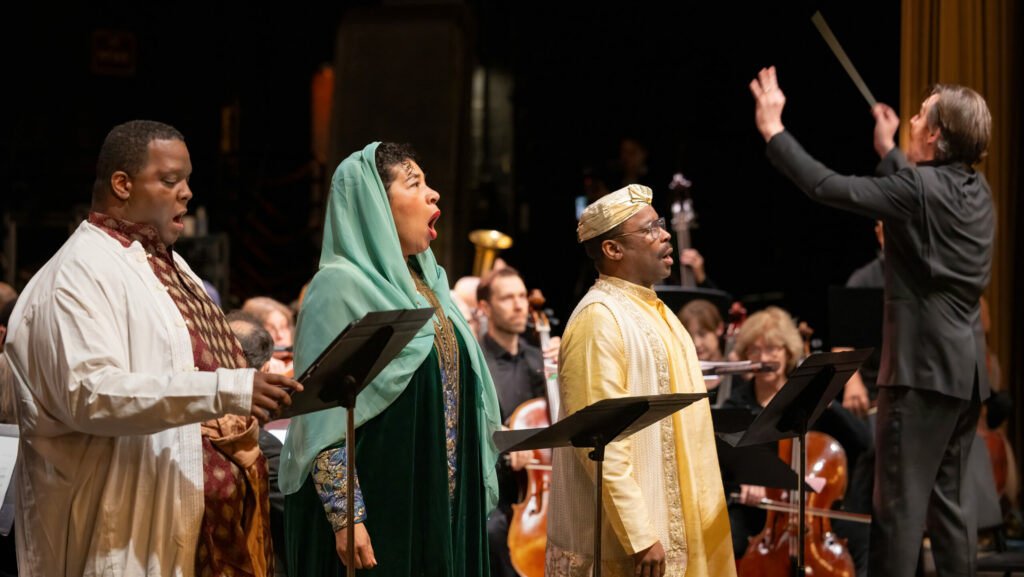
Jennifer Packard Photos, Courtesy of Opera Lafayette
The fascinating story of Dédé, a free man of color born in the U.S. in 1827 who found success as a composer and musician in France in the mid-19th century, and of the rediscovery and reconstruction of the handwritten manuscript of his masterwork, has been covered in these pages and elsewhere so I won’t go into detail here. But it’s a story that has clearly captivated readers and drew an enthusiastic mix of DC’s usual concert-going suspects and curious new audience members to pack the Lincoln Theatre. Security snafus further heightened the anticipation as the 7 PM curtain was held until nearly 7:30 to process the long line snaking through the alley and out to V street, with audience members awkwardly fielding questions from passersby (“Hey what show are you guys in line for?” “Uh ok it’s not really a show it’s this opera thing but like an old opera they found?”)
After all that fanfare, finally getting to listen to the thing might have been a bit anticlimactic. But the appeal Dédé’s opera, to a libretto by Louis Brunet, indeed feels like a bit of a miracle. Morgiane draws on a number of currents in French opera, some of which may be less appealing to modern audiences, like the grand opera story beats and exotic Eastern locale. But the music itself captures many of the features that have kept the chestnuts of the late 19th-century French repertoire in constant rotation: irresistible tunes, memorable character-driven songs, and an ability to combine comic and tragic tonalities.
The assembly of these concerts, led by Opera Lafayette Artistic Director Designate Patrick Dupre Quigley, has reportedly been a bit of a miracle itself, and the performance product was indeed a bit of a work in progress. Comfort with the new score varied across sections of the Opera Lafayette Orchestra and a certain default cautiousness pervaded throughout. That variability could extend to the cast and chorus (featuring the singers of the OperaCréole ensemble) as well, with some passages still clearly being felt out. But the commitment to bring this work to light was clear and it’s a credit to the score that it could shine brightly even when reflected in a slightly foggy glass.
(Spoilers for Morgiane ahead, not usually an issue for works of the 1880s but this is an exception!)
The opera’s overture sets the stage for the smorgasbord of melodic invention to come, a highly entertaining compression of key themes that traverses the work’s full gamut of emotional states and primes the start of Act I with a big oompah and cymbals and finishes in the mode of Carmen’s beloved overture. Quigley maintained a firm hold on the reins here to meet the band where they were, but it was easy to imagine how much this passage would cook in a polished reading.
The action proper begins with the first of the work’s many notable choruses, here the wedding guests for Ali and Amine singing a gentle hymn to the blessed day. The especially dense interplay between orchestra and chorus that will be a hallmark of the choral passages throughout the work is immediately evident, Dédé’s score making use of coloring in the orchestra to continually enrich the choral writing.
A series of numbers for the principals ensues to establish the plot’s central mystery: bride Amine learns that her father, Hagi Hassan, is not her biological father, but her mother Morgiane refuses to reveal the truth of her parentage.
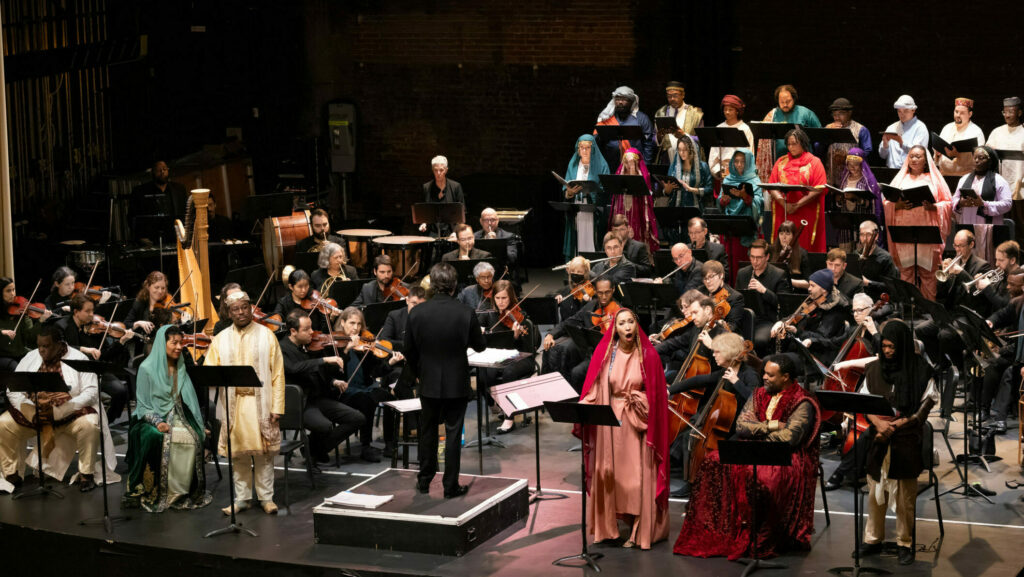
Jennifer Packard Photos, Courtesy of Opera Lafayette
Dédé’s writing maintains a high degree of interest throughout this sequence. There is the expansive introduction for Father-of-the-bride Hassan with long impassioned lines that brought to mind some of Berlioz’s more taxing vocal writing. Joshua Conyers’s big sturdy baritone easily filled the hall with fatherly authority here, though he succumbed a bit to the big demands by the end of the aria.
Mother Morgiane’s debut makes similar demands of flexibility on its soprano, which soprano Mary Elizabeth Williams met handily, previewing the dramatic immediacy and radiant sound she was to bring to the character’s music throughout the evening. Tenor Chauncey Packer’s pointed sound and diction delivered some of the most distinctive French style for bridegroom Ali’s lyric material, though his urgent sound had a bit of a hard limit toward the top of the part’s range. Finally, the writing for daughter Amine’s character opens a whole new vein of musical material with coloratura flourishes embroidering her first aria, neatly dispatched here by soprano Nicole Cabell.
Things quickly go south for the wedding party with the surprise arrival of Beher, dread emissary of the Sultan, Jonathan Woody’s energetic baritone intoning Amine’s abduction with gleeful sadism. Some subsequent back and forth about the abduction overstayed its welcome a bit and invited some rough going in the ensemble. But this was thankfully just a bit of filler before Dédé’s score finds an additional gear for a finale bringing together ensemble, chorus, and orchestra in a whirlwind conclusion.
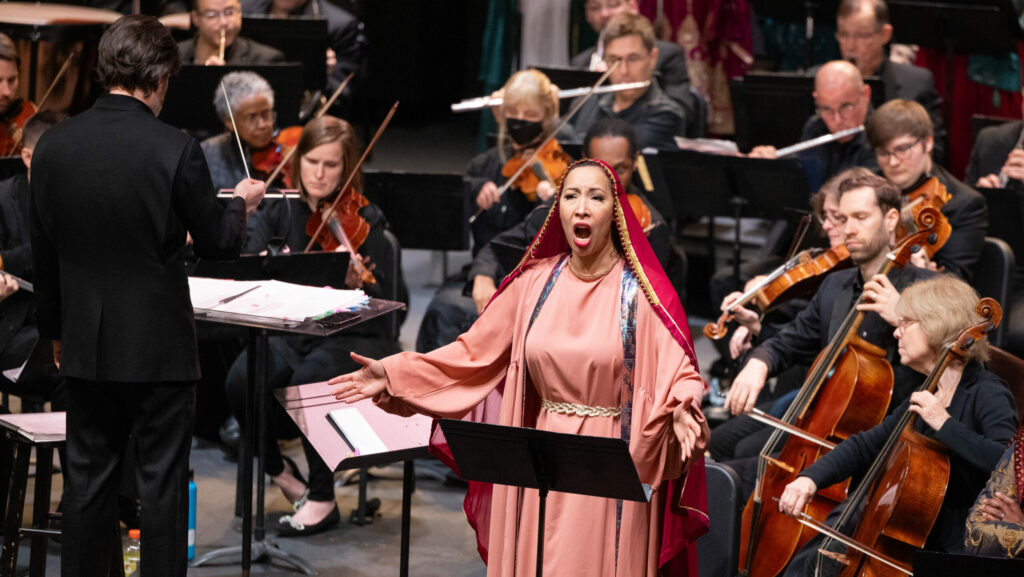
Jennifer Packard Photos, Courtesy of Opera Lafayette
Act II opens on the family hot in pursuit at the great market at Ispahan, another compelling chorus establishing the scene over intricate string writing beneath. The exotic market is clearly pitched as Morgiane’s blowout mise-en-scène opportunity and may work with a sufficient application of pageantry. But at least in a concert setting this section seemed to be spinning its wheels a bit after the initial chorus, Conyers unable to make much of a long story aria for Hassan and another chorus that didn’t feel sufficiently differentiated from the opening material.
Things perk up when Amine is sighted in the crowd with Beher. If a little hard to parse in concert, this sequence seemed like it could be very dynamic onstage, Amine’s cries at the crowd’s inaction juxtaposed with the family’s futile protestations while dastardly Beher manically chews the scenery. Amine gets a preview here of the choice she will have to make between her life and becoming the Sultan’s bride, Cabell’s anguished response capped by a shivering high note.
The coda to Act II reunites with the family scheming about their plans to infiltrate the palace in one of the work’s best small ensembles, a delicious vengeance trio (surely the best kind of trio) for Morgiane, Hassan, and Ali. Ali runs away with the vengeance theme in some of the character’s most swashbuckling music. While Packer’s focused, lighter weight sound duly generated excitement here, one couldn’t help but fantasy cast the kind of heavier instruments that could make a meal out of this music, say a Russell Thomas, Michael Spyres, or Bryan Hymel.
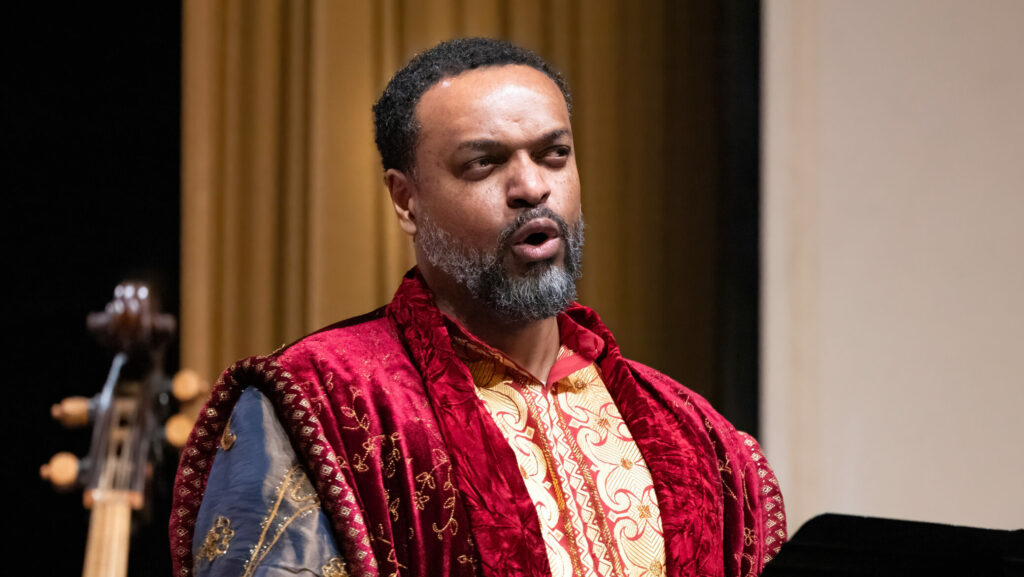
Jennifer Packard Photos, Courtesy of Opera Lafayette
Act III finally brings us Sultan Kourouschah, and from the references to his wretched appetites in the previous two Acts, one might have expected a terrifying introduction. But Dédé neatly undercuts expectations and presents us with a troubled monarch whose rage is tempered by a deep loneliness. Mind you, that aspect is mostly gleaned from Dédé’s moody, vulnerable vocal lines in the Sultan’s long monologue; Brunet’s libretto is more focused on just blaming the ladies who seem to be unreceptive to his offers of marriage or death. Bass Kenneth Kellogg imbued the Sultan’s lines with a plainspoken gravity marred by just a bit of raggedness around the edges. (Putting the fantasy casting hat back on, Ryan Speedo Green came to mind, but that quality of rueful authority might be captured by any number of successful Kings Phillip.)
Amine is now finally brought before the Sultan, her pleas for pity and mercy delivered in a wrenching bit of vocal writing before the increasing tension breaks out into some more fioritura and a punchy duet for the Sultan and his unwilling conquest. The Sultan proceeds to offer her the crown in exchange for her submission but it’s almost an act of desperation at this point, the mix of frenzied passion and pride calling to mind the hitman’s proposal in Act II of Mazeppa.
This impasse is interrupted by the arrival of Hassan, Morgiane, and Ali disguised as singers, who entertain the Sultan with a song intended to (somehow) shame him into releasing his captive. This performance within the performance material is charming enough, though your mileage may vary. It all falls apart as Ali does not have anywhere near the chill necessary for this plan and in a blaze of tenor fury he accuses the Sultan directly. The family is discovered and marked for the dungeon in another bravura chorus/ensemble passage notable for an unexpected turn where the chorus falls away in the final bars to leave the principals to deliver a blistering final ensemble.
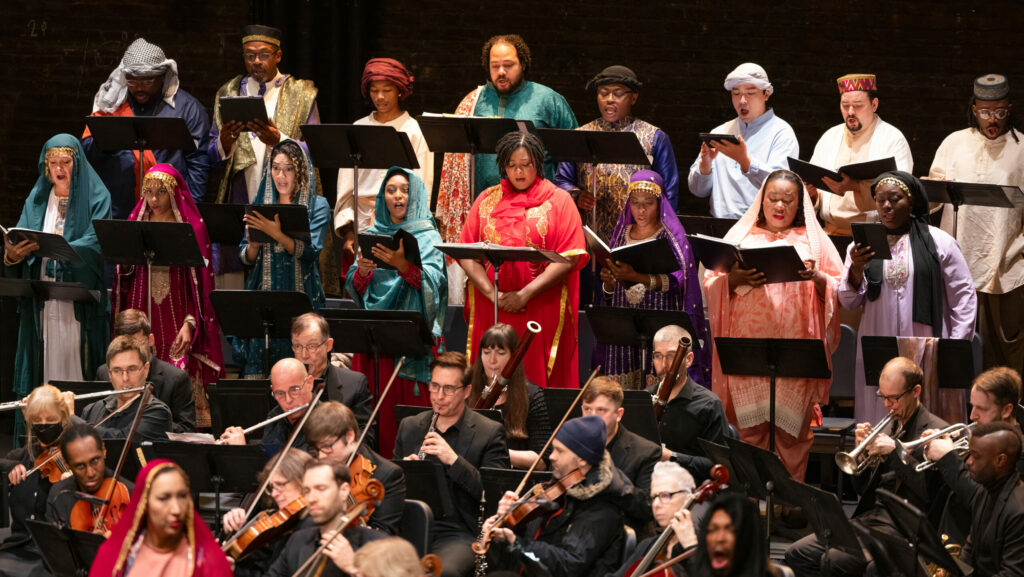
Jennifer Packard Photos, Courtesy of Opera Lafayette
Act IV opens with Morgiane’s resolution to finally reveal the secret of Amine’s birth and save everyone from prison, Mary Elizabeth Williams commanding the stage in short scena wrestling with her choice. Rather than getting on with the reveal, the libretto wanders a bit here, though Dédé maintains interest with Amine’s heartfelt resignation to sacrifice a disarmingly beautiful quartet from the family at the final moment before the Sultan issues his judgment.
Now the reveal finally comes, Morgiane unveiling in a searing vocal display that Amine is in fact the Sultan’s daughter, a deus ex machina whose comic implications are fully appreciated by the libretto. But that levity isn’t a cue to race towards the curtain just yet. Hassan is still baffled by the revelation and his grappling turns into a surprisingly ardent and touching aria about fathering Amine as an infant. Morgiane responds with her own poignant digression on motherhood, exquisitely rendered by Williams in softly graded dynamics, as well as an affecting statement about how she changed her own life when she decided to leave the Sultan. (Perhaps some light libretto updating might be at play here but the moment works.)
The only thread left to resolve is the Sultan’s redemption. After some understandable hesitance on the part of Amine, who was being threatened with lifelong sexual slavery not five minutes ago, Ali intercedes and they both make peace. But the happy wrap-up vibes are getting delirious now and the chorus is starting to get involved as the orchestra flips into an infectious sort of waltz meter. A glowingly sung final benediction from Kellogg’s Sultan gives way to a concise but memorable final stretch for the assembled forces that I found myself actually humming as I left the theater.
Morgiane’s musical and dramatic interest can no doubt command audiences’ attention, even beyond the remarkable story and its significance for the work of revealing the stories of composers of color, and will hopefully be taken up by other companies after this run is complete. (It heads to New York Wednesday and then back to the DMV; Friday’s performance at the University of Maryland will be livestreamed for free.) But the emotional weight of the project really hit me somewhere around that Act IV quartet, namely the privilege we have as audiences drawn to the music of the past to be able to discover and celebrate these astonishing artifacts of beauty and human feeling labored over previous generations, a privilege that is all the more poignant when those generations had to labor in obscurity.


